Azerbaijan’s defense spending hits $4.8 billion
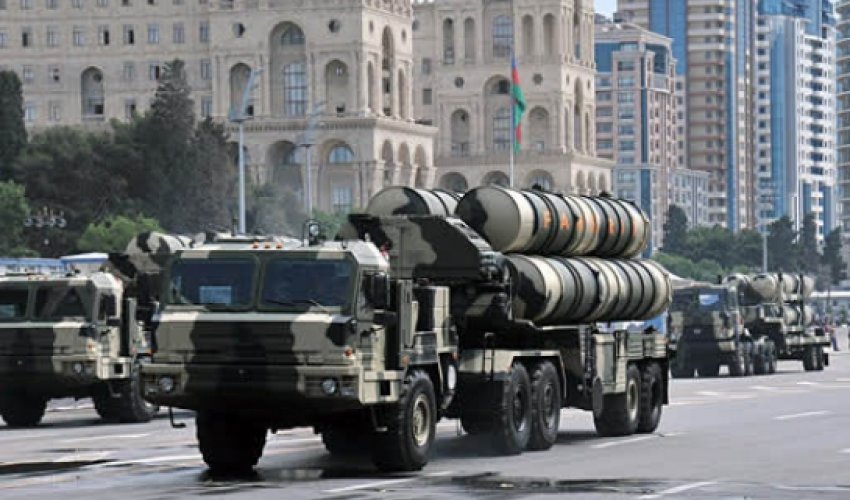
(Silk Road Reporters) - Azerbaijan and Armenia have been locked in a military and diplomatic stalemate over Nagorno-Karabakh for the past two decades.
Armenia went to war with Azerbaijan in February 1988 over the region, with military operations lasting until May 1994 at a cost of 30,000 lives, when a ceasefire brokered by Russia left Armenia controlling Nagorno-Karabakh and seven adjacent districts, approximately 20 percent of Azeri territory, something that Baku has never accepted.
A final peace treaty has not been signed and the two sides regularly trade accusations of cease-fire violations. For the past 20 years the "frozen conflict” has rebuffed all diplomatic efforts to resolve the dispute, and Azerbaijan, the third-largest oil producer in the former Soviet Union, is now to pour some of its oil revenues into beefing up its military forces in the event of another clash.
On Nov. 19 Azeri Finance Minister Samir Sharifov said, "Azerbaijan’s armed forces need better equipment as Armenia continues its occupation policy in defiance of international law” and announced that in 2015 Azerbaijan’s defense budget would increase 27 percent to $4.8 billion, 17.9 per cent of the government’s budget expenditures, exceeding Armenia’s total budget of $3.2 billion.
Azerbaijan’s 2014 military budget was $3.8 billion, up from $3.6 billion in 2013 and $3 billion in 2012. In comparison, Armenia’s 2013 defense budget was $447 million. Shafirov told Parliament, "At a time when Armenia is taking no heed of norms and principles of international laws, continues its occupation policy and provocations on the contact line (between Armenian and Azerbaijani troops in the Nagorno Karabakh conflict zone), there is no need for an extra justification for an improvement in supplies of the Azerbaijani armed forces.” According to Azerbaijan’s state budget for 2014, total budget revenues in Azerbaijan are $23.4 billion with total expenditures amounting to $25.5 billion.
This massive buildup has the full support of Azeri President Ilham Aliyev, who is also the commander-in-chief of his country’s Armed Forces. In discussing his country’s increased armaments spending Aliyev said, "It is our priority and we will continue to increase military spending. Over the past 10 years, our military spending has increased more than 20-fold, and our spending allocated to the Armed Forces is approximately twice as large as Armenia’s overall state budget. The Ministry of Defense Industry has produced 900 types of military weapons since 2005, and this process continues… In the future, we should completely provide ourselves with military supplies and equipment. At the same time, we buy and will buy various types of modern equipment.”
The military increases come despite the fact that Aliyev has met his Armenian counterpart Serzh Sargsyan twice in the past three months first in Aug. in Sochi along with Russian President Vladimir Putin, the second time on Oct. 27 in Paris under the auspices of the Organization for Security and Cooperation in Europe (OSCE) Minsk Group, nothing concrete was accomplished in resolving the two nation’s outstanding disputes.
The day after Sharifov spoke the Azerbaijani Foreign Ministry released a statement averring that Armenia was continuing to strengthen its military presence and capabilities on the Azeri territories it occupied, noting that on Nov. 6 the Armenian military held "provocative large-scale military exercises” in the occupied territories, which involved roughly 47,000 troops, according to Armenian "official media resources.”
The exercises were the background for Azeri forces on Nov. 12 shooting down an Erebuni based Armenian air force Mi-24 attack helicopter near Kengerly village in the occupied Aghdam district. This is the first such incident since the 1994 ceasefire. More than 20 people were killed on both sides in August alone, when skirmishes along the heavily militarized cease-fire line turned the deadliest since 1994.
The Nagorno-Karabakh separatist government confirmed the downing and after announcing the deaths of the Mi-24’s three crew members stated that the helicopter was "conducting training” rather than an offensive military mission. Armenian Ministry of Defense spokesman Artsrun Hovhannisyan warned Azerbaijan that the "consequences for this unprecedented aggravation of the situation will be very painful for the Azeri side.” The day after the incident Azerbaijani Ministry of Foreign Affairs published a statement noting, "Azerbaijan has declared a no-fly zone throughout the occupied territories and issued a standard notice for all members of the International Civil Aviation Organization (ICAO). The illegal penetration of Azerbaijan’s airspace by Armenian military helicopters is an act of ongoing occupation and aggression against Azerbaijan and a policy of encroachment on territorial integrity and sovereignty of the republic.”
In the aftermath of the military exercises and downed helicopter, the Azeri Ministry of Defense was more forceful, stating that "if Armenia once again resorts to any military operation, the Azerbaijani armed forces’ immediate strike to the invaders will be extremely effective and destructive, leading to heavy losses and destruction that they will not forgot for a long time,” adding, "This political and military statement is perhaps the last warning for the Armenian regime ahead of war… The Azerbaijani armed forces are capable and stand ready to prevent any provocation by the enemy.”
After the helicopter incident Aliyev visited the Samkir army corps in western Azerbaijan and after holding a closed meeting with army commanders, announced that the Azeri army was ready for battle at any moment.
Four United Nations Security Council (USNC) Resolutions – 822 (April 30, 1993), 853 (July 29, 1993), 874 (Oct. 14, 1993) and 884 (Nov. 12, 1993), which required the immediate and unconditional withdrawal of Armenian forces from Azerbaijani lands, have never been implemented.
As for the district where the recent helicopter incident occurred, USNC Resolution 853, which reaffirmed the sovereignty and territorial integrity of Azerbaijan specifically "condemns the seizure of the district of Agdam and of all other recently occupied areas of the Azerbaijani Republic” and "demands immediate, complete and unconditional withdrawal of the occupying forces involved from the district of Aghdam and all other recently occupied areas of the Azerbaijani Republic.”
Regarding the UNSC’s subsequent lack of action Aliyev dourly commented, "There are four UN Security Council resolutions that demand the unconditional withdrawal of Armenian forces from the occupied lands. Twenty years have passed. None of them are fulfilled. The international community’s is indifferent to this.”
In the interim, rhetoric and increased military expenditures have overtaken diplomacy. Aliyev has repeatedly said that the military option remains on the table to resolve the conflict and that accordingly the Azeri army will be supplied with the requisite advanced weaponry needed to reclaim its Armenian-held territories. In the international arms market, Azerbaijan has been purchasing weapons from former fellow Soviet republics Russia, Belarus and Ukraine, but building military equipment in joint production programs with South Africa and Turkey. Israel is also in the Azeri arms market, selling drones.
Armenia buys weapons from Russia for low prices as a member of the Moscow-led Collective Security Treaty Organization (CSTO) and Russia also maintains two military bases in Armenia at Gyumri, on Armenia’s border with Turkey and the Erebuni airbase near Yerevan.
Azerbaijan’s military expenditures are giving it a quantitative edge, as in June Azeri Defense Minister Zakir Hasanov noted that the Armenian defense spending is 5.3 times less than what Azerbaijan spends. Nor are personnel neglected; Hasanov added that Azerbaijan currently has bilateral military cooperation with 57 countries and signed agreements and memoranda with 34 countries. Hasanov added that 90 Azerbaijani servicemen, two military doctors and two engineering officers serve as part of the International Security Assistance Force (ISAF) contingent in Afghanistan. In attempt to gauge broader regional military support, on Aug. 19 Hasanov met with then Georgian Defense Minister Irakli Alasania and Turkish Defense Minister Ismet Yilmaz in Nakhchivan to consider the "military-political situation in the region.”
Azerbaijan is swiftly turning into an armaments bazaar for foreign military companies eager to peddle their wares, holding its first international defense-industry show, ADEX-2014, Sep. 11-13 in Baku. In his opening remarks at ADEX-2014 Aliyev remarked that "in the current world, countries have to keep facing new security challenges, which make cooperation and the exchange of modern military technologies more important.” In hopes of making sales, 200 companies from 34 countries, including the United States and Russia, participated in ADEX-2014.
Shorn of its rhetoric, Azerbaijan’s military spending spree effectively means that over the past decades the military parity between the sides has shifted in favor of Azerbaijan. In 2011 Azerbaijan boosted military expenditures by 88 percent in real terms, the biggest increase in the world, according to the Stockholm International Peace Research Institute (SIPRI).
The buildup of armaments in proximity to a ramping up of rhetoric has combined with flaccid international diplomacy to increase tensions where both eastern and western interests focus on the Caspian’s energy riches. Both Russia and Europe have an interest in thawing the Azeri-Armenian deadlock over Nagorno-Karabakh, but as relations chill between Europe and Russia over Ukraine, the issue slips lower down the bilateral agenda. Whether Aliyev will leave the military option "on the table” or at some point feel his armaments give him a sufficient edge to initiate hostilities is a diplomatic imbroglio that should receive the highest attention and renewed diplomatic initiatives from the UN, EU, OSCE, Russia, Georgia and Turkey.
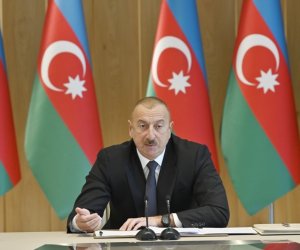
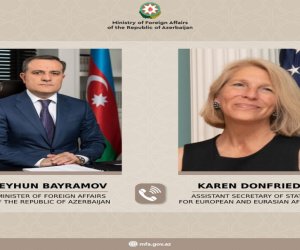

























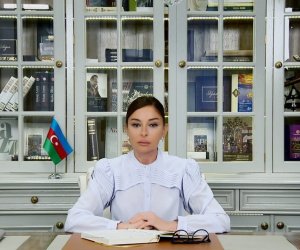
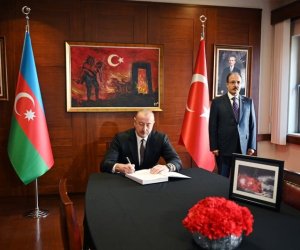
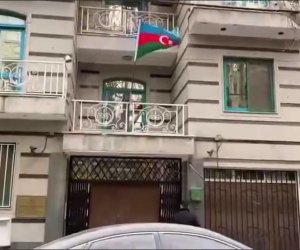
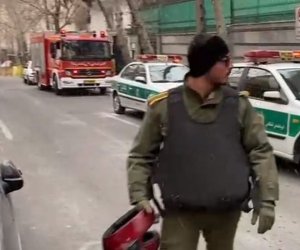
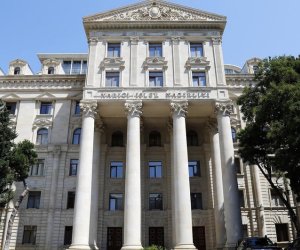
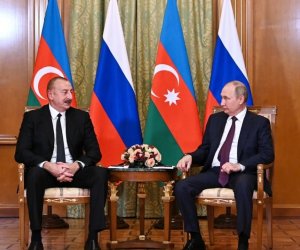



 Photo
Photo 



 Video
Video 

